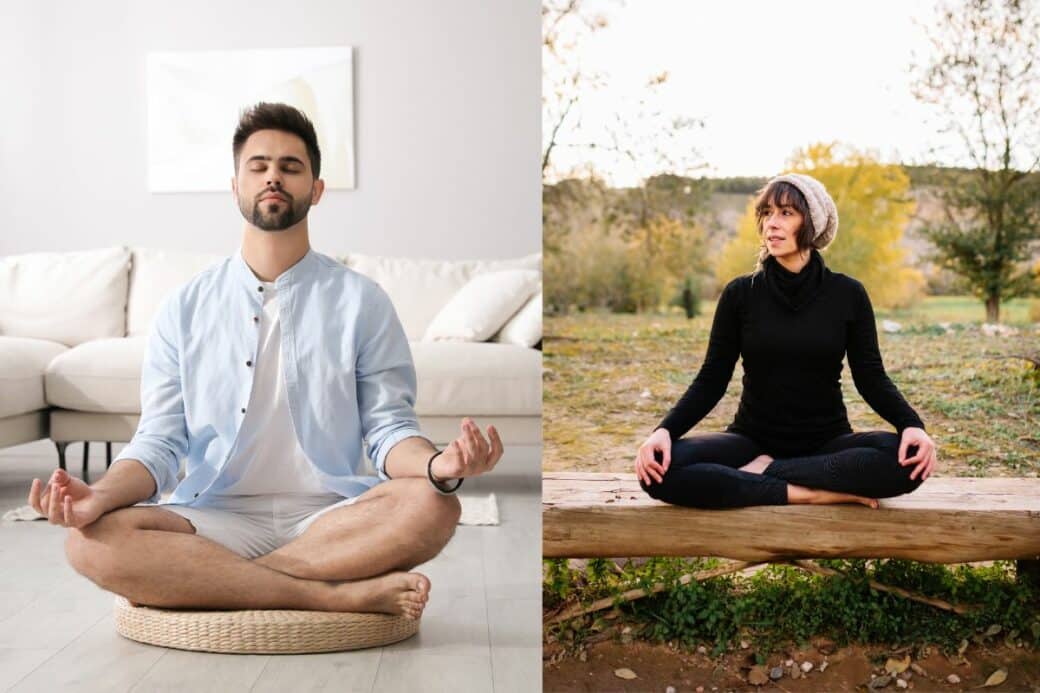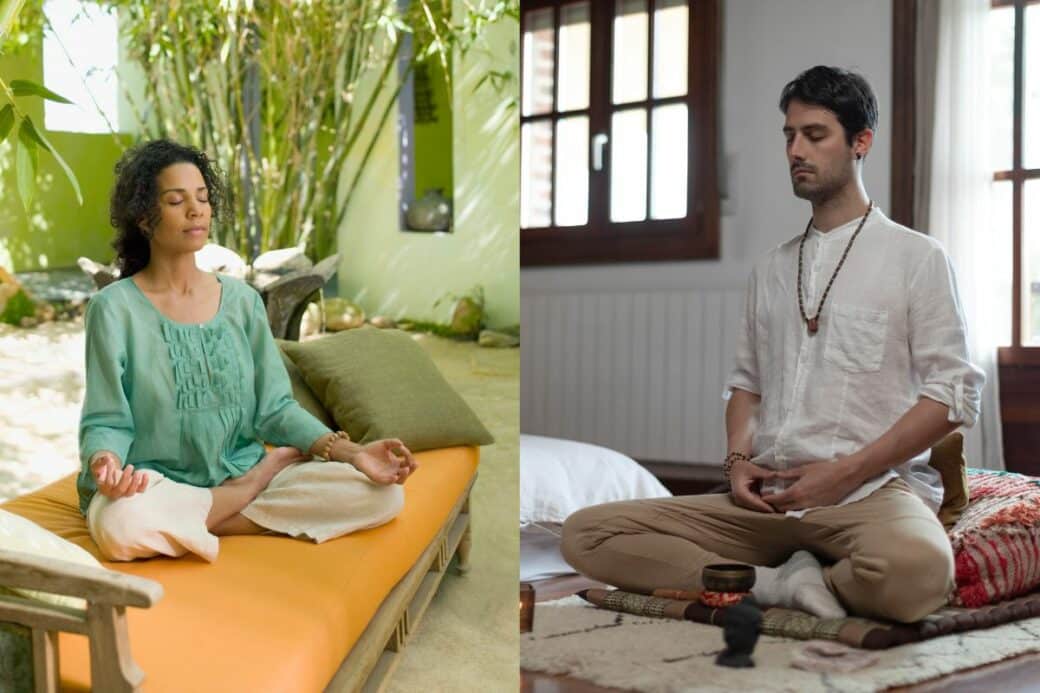Are you curious about the differences between meditation and mindfulness? Look no further! In this article, we will explore the distinctions between these two practices, shedding light on their unique qualities and benefits. Whether you are a seasoned practitioner or just starting your journey towards inner peace, understanding the nuances of meditation and mindfulness will provide you with valuable insights to enhance your well-being and cultivate a more present and centered life. So, let’s embark on this enlightening exploration together!

Meditation Vs Mindfulness: Meditation
What is Meditation?
Meditation is a practice that involves focusing your mind and eliminating the stream of thoughts that often fill our minds. It is a way to achieve a state of mental clarity and emotional calmness, allowing you to tap into the present moment and become more aware of your thoughts and feelings.
Types of Meditation
There are various types of meditation, each with its own techniques and philosophies. Some popular types of meditation include:
-
Mindfulness Meditation: This type of meditation involves paying attention to the present moment, non-judgmentally, and observing your thoughts and emotions without getting attached to them.
-
Loving-Kindness Meditation: In this practice, you cultivate feelings of kindness and compassion towards yourself and others, promoting a sense of empathy and connection.
-
Transcendental Meditation: Transcendental Meditation uses silent repetition of a mantra, which is a specific word or sound, to help calm the mind and achieve a state of deep relaxation.
-
Guided Meditation: Guided meditation involves following the instructions of a teacher or audio recording to help you relax, focus, and visualize.
Benefits of Meditation
Meditation offers a wide range of benefits for both the mind and body. Some of the benefits of regular meditation practice include:
-
Stress Reduction: Meditation helps to reduce stress by calming the mind and activating the body’s relaxation response.
-
Improved Mental Health: Regular meditation practice has been shown to decrease symptoms of anxiety and depression, improve attention span, and increase feelings of well-being.
-
Enhanced Self-Awareness: By practicing meditation, you develop a greater understanding of your thoughts, emotions, and patterns of behavior, leading to increased self-awareness and personal growth.
-
Improved Focus and Concentration: Meditation trains your mind to stay focused on the present moment, which can improve your ability to concentrate and stay attentive.
How to Meditate
Meditation is a simple practice that can be done by anyone, anywhere. To start meditating, follow these basic steps:
-
Find a Quiet Space: Choose a quiet and comfortable space where you can sit without distractions.
-
Get in a Comfortable Position: Sit in a position that allows you to relax, whether it’s cross-legged on the floor or on a chair with your feet flat on the ground.
-
Focus on Your Breath: Close your eyes and pay attention to your breath. Notice the sensation of the breath entering and leaving your body.
-
Acknowledge Your Thoughts: As thoughts arise, simply observe them without judgment and bring your attention back to your breath.
-
Continue and Repeat: Practice this process for a designated amount of time, gradually increasing the duration of each session as you become more comfortable.
Common Misconceptions about Meditation
There are several misconceptions about meditation that may discourage people from trying it. Let’s debunk some of the common myths and misunderstandings:
-
You Need to Clear Your Mind: The aim of meditation is not to stop your thoughts completely. Instead, it’s about observing your thoughts without getting caught up in them.
-
It’s a Religious Practice: While meditation is often associated with certain religious traditions, it is not exclusive to any particular belief system. Anyone can practice meditation, regardless of their religious or spiritual background.
-
It Takes a Lot of Time: Even a few minutes of meditation each day can have a positive impact. You can start with just a few minutes and gradually increase the duration as you feel more comfortable.
-
It’s Only for Calming Down: While meditation is known for its relaxation benefits, it also helps with focus, self-awareness, and emotional regulation.
Mindfulness
What is Mindfulness?
Mindfulness is a state of active and open attention to the present moment, without judgment. It involves being fully engaged in whatever you are doing, whether it’s eating, walking, or even just breathing. By practicing mindfulness, you can cultivate a sense of awareness and acceptance of your thoughts, emotions, and sensations.
Principles of Mindfulness
There are a few key principles that guide the practice of mindfulness:
-
Non-judgment: Mindfulness involves observing your thoughts and experiences without labeling them as good or bad. It requires accepting things as they are, without attaching judgment or criticism.
-
Beginner’s Mind: Mindfulness encourages approaching each moment with a beginner’s mind, free from preconceived notions or expectations. This helps to cultivate a sense of curiosity and open-mindedness.
-
Acceptance: Mindfulness emphasizes accepting the present moment as it is, rather than trying to change or resist it. It involves acknowledging and embracing the reality of each experience, whether pleasant or unpleasant.
Benefits of Mindfulness
Practicing mindfulness regularly can have numerous benefits for your overall well-being. Some of the key benefits of mindfulness include:
-
Reduced Stress and Anxiety: Mindfulness has been shown to reduce stress and anxiety by increasing your ability to regulate your emotions and respond to stressful situations with greater ease.
-
Improved Mental Focus: By training your mind to stay present and focused on the task at hand, mindfulness can enhance your concentration and improve your ability to stay on track.
-
Enhanced Emotional Well-being: The practice of mindfulness helps you develop a greater awareness of your emotions, allowing you to respond to them in a more balanced and constructive manner.
-
Better Relationships: Mindfulness can improve the quality of your relationships by promoting empathy, compassion, and effective communication skills.
How to Practice Mindfulness
Practicing mindfulness doesn’t require any special equipment or preparation. Here are some simple steps to incorporate mindfulness into your daily life:
-
Start with Small Moments: Begin by setting aside a few minutes each day to engage in a mindfulness practice. You can start by focusing on your breath, sensations in your body, or simply observing your thoughts without judgment.
-
Engage Fully in Activities: As you go about your daily activities, try to bring your full attention to the present moment. Whether you’re eating, walking, or conversing with others, be fully present and engaged in the experience.
-
Take Mindful Breaks: Throughout the day, take short breaks to check in with yourself and bring awareness to your thoughts, emotions, and physical sensations. This can help you recharge and refocus your energy.
-
Practice Acceptance and Non-judgment: Cultivate an attitude of acceptance towards your thoughts and experiences, letting go of judgment and embracing each moment as it unfolds.
Applications of Mindfulness
Mindfulness can be applied to various aspects of your life, enhancing your overall well-being and satisfaction. Here are some common areas where mindfulness can be beneficial:
-
Work-Life Balance: Mindfulness can help you find a balance between work and personal life by helping you stay present and fully engaged in each moment.
-
Stress Management: Mindfulness can be a powerful tool for managing stress by increasing your ability to stay calm and centered in the face of challenging situations.
-
Relationships and Communication: Mindfulness enhances your ability to listen and communicate effectively, promoting understanding, empathy, and connection with others.
-
Self-Care and Personal Growth: By practicing mindfulness, you can develop a greater sense of self-awareness, self-compassion, and personal growth.
Comparison
Definition
Meditation and mindfulness are often used interchangeably, but they have distinct definitions:
-
Meditation: Meditation is a practice that involves focusing the mind and achieving a state of mental clarity and emotional calmness by eliminating the stream of thoughts.
-
Mindfulness: Mindfulness is a state of active and open attention to the present moment, without judgment. It involves being fully engaged in whatever you are doing.
Focus and Attention
-
Meditation: In meditation, the focus is on clearing the mind and achieving a state of mental stillness. The attention is inward, observing thoughts and emotions without getting attached to them.
-
Mindfulness: Mindfulness focuses on the present moment, directing attention to sensations, thoughts, and emotions as they arise with a non-judgmental attitude.
Approach
-
Meditation: Meditation often involves sitting in silence, focusing on the breath, or repeating a mantra. It requires a more formal practice and dedicated time to cultivate a meditative state.
-
Mindfulness: Mindfulness can be practiced in any moment and during any activity. It emphasizes bringing awareness to daily experiences and engaging in them fully.
Purpose
-
Meditation: The purpose of meditation is to achieve a state of mental calmness, increased self-awareness, and personal growth. It can also serve as a spiritual practice in some traditions.
-
Mindfulness: The purpose of mindfulness is to cultivate an attitude of acceptance, enhance presence, and develop a deeper understanding of oneself and the world around.
Concept of Self
-
Meditation: In meditation, there is often an exploration of the self and the nature of existence. It can involve questioning the ego and exploring the nature of consciousness.
-
Mindfulness: Mindfulness encourages a non-attached observation of the self, allowing thoughts and emotions to arise without identification or judgment.
Emotional Regulation
-
Meditation: Regular meditation practice can help regulate emotions by increasing awareness of emotional states and developing a non-reactive attitude towards them.
-
Mindfulness: Mindfulness practice promotes emotional regulation by allowing emotions to be observed without judgment, which can lead to a more balanced and mindful response to emotions.
Physical Benefits
-
Meditation: Meditation has been linked to various physical health benefits, including reduced blood pressure, improved sleep, and enhanced immune function.
-
Mindfulness: While mindfulness is primarily focused on the mind, it can indirectly lead to physical benefits by reducing stress and promoting overall well-being.
Cognitive Effects
-
Meditation: Meditation has been shown to improve cognitive functions such as attention, memory, and creativity. It can also enhance problem-solving skills and increase mental flexibility.
-
Mindfulness: Mindfulness practice has been found to increase cognitive flexibility, improve working memory, and enhance decision-making abilities.
Scientific Research and Evidence
Both meditation and mindfulness have been extensively studied, and scientific research supports their effectiveness in various areas of well-being and mental health. Numerous studies have shown the positive impact of meditation and mindfulness on stress reduction, anxiety management, and overall mental well-being.
Integration into Daily Life
Both meditation and mindfulness can be integrated into your daily life to experience their benefits. Whether you prefer dedicated meditation sessions or incorporating mindfulness into routine activities, the key is to find a practice that works for you and supports your overall well-being.
Which One is Right for You?
When considering whether meditation or mindfulness is right for you, it’s important to consider several factors:
Personal Goals and Preferences
Think about what you hope to achieve through the practice. If you’re looking for a deeper exploration of self and personal growth, meditation might be a good fit. If you’re seeking to cultivate presence and acceptance in daily life, mindfulness can be more aligned with your goals.
Time and Commitment
Consider the amount of time and commitment you can dedicate to practice. Meditation often requires more focused time and discipline, while mindfulness can be integrated into your daily activities with smaller time commitments.
Accessibility and Practicality
Think about the accessibility and practicality of each practice. Meditation can be done anywhere, but it may require a quiet space and a comfortable seated position. Mindfulness, on the other hand, can be practiced during any activity, making it more practical for those with a busy lifestyle.
Needs for Relaxation or Mental Clarity
If you’re looking for deep relaxation and calming the mind, meditation techniques such as guided meditation or transcendental meditation can be beneficial. If you’re seeking to develop mental clarity and focus, mindfulness practice can help you achieve that.
Starting Point and Prior Experience
Consider your starting point and prior experience with meditation and mindfulness. If you’re new to both practices, starting with mindfulness might be more accessible and easier to incorporate into your daily life. If you have previous experience with meditation, you might choose to deepen your practice or explore different meditation techniques.
Combining Meditation and Mindfulness
Remember that meditation and mindfulness are not mutually exclusive. In fact, they can complement each other. Many meditation practices incorporate mindfulness techniques, and mindfulness practice can deepen your meditation experience. Experimenting with both practices can help you find the right balance that suits your needs and preferences.
Conclusion
Meditation and mindfulness are powerful practices that can enhance your overall well-being, reduce stress, and improve your mental and emotional health. Whether you choose to explore meditation or mindfulness or integrate both into your daily life, the key is to find a practice that aligns with your goals, preferences, and lifestyle.
By incorporating meditation or mindfulness into your life, you can cultivate a greater sense of self-awareness, improve your ability to manage stress, foster stronger relationships, and experience a deeper sense of peace and contentment. So, take a moment today to start your journey towards a calmer and more mindful life!




